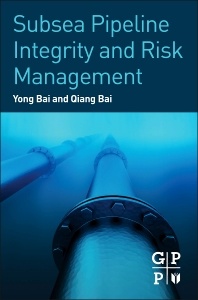Subsea Pipeline Integrity and Risk Management
Auteurs : Bai Yong, Bai Qiang

Subsea repairs and inspection are costly for petroleum and pipeline engineers and proper training is needed to focus on ensuring system strength and integrity. Subsea Pipeline Integrity and Risk Management is the perfect companion for new engineers who need to be aware of the state-of-the-art techniques. This handbook offers a "hands-on" problem-solving approach to integrity management, leak detection, and reliability applications such as risk analysis.
Wide-ranging and easy-to-use, the book is packed with data tables, illustrations, and calculations, with a focus on pipeline corrosion, flexible pipes, and subsea repair. Reliability-based models also provide a decision making tool for day-to-day use. Subsea Pipeline Integrity and Risk Management gives the engineer the power and knowledge to protect offshore pipeline investments safely and effectively.
PART I: PIPELINE INTEGRITY MANAGEMENT
- Corroded Pipelines
- Buckling/Collapse of Corroded Pipes
- Dented Pipelines
- Pipeline Inspection and Subsea Repair
- Integrity Management and Flexible Pipes
- Leak Detection Systems
- Fibre Optical Monitoring System
PART II: RISK AND RELIABILITY APPLICATIONS
- Risk Analysis for Subsea Pipelines
- Risk-Based Inspection (RBI)
- Reliability-Based Strength Design of Pipelines
- LCC Modeling as a Decision Making Tool in Pipeline Design
- Quantitative Risk Analysis-Based RBI
- Reliability-Based Fitness for Service
- Pipeline Flow Risk Assessment
- Marine Traffic Risk Assessment
- CoF Modeling for Quantitative Risk Analysis
- Environmental Impact Assessment
- Oil Spill Response Plan
Petroleum Engineers, Structural Engineers, Production Engineers and Pipeline Engineers, Pipeline Construction Engineers
Dr. Qiang Bai obtained a doctorate for Mechanical Engineering at Kyushu University, Japan in 1995. He has more than 20 years of experience in subsea/offshore engineering including research and engineering execution. He has worked at Kyushu University in Japan, UCLA, OPE, JP Kenny, and Technip. His experience includes various aspects of flow assurance and the design and installation of subsea structures, pipelines and riser systems. Dr. Bai is the coauthor of Subsea Pipelines and Risers.
- Includes material selection for linepipe, especially selection of standard carbon steel linepipe
- Covers assessment of various types of corrosion processes and definition of anti-corrosion design against internal as well as external corrosion
- Gives process and flow assurance for pipeline systems including pipeline integrity management
Date de parution : 04-2014
Ouvrage de 428 p.
15x22.8 cm
Épuisé
Thème de Subsea Pipeline Integrity and Risk Management :
Mots-clés :
Corroded Pipeline; Defect Prediction Model; Reliability Based Design; Re-qualification Criteria; Sour Corrosion; Sweet Corrosion; Corroded Pipes; Moment Capacity; Internal Pressure; Bending and Axial Force; Combined Loads; Analytical Analysis; Mechanical Damage; Leakage; Structural Integrity; Burst Strength Criteria; Fracture Assessment; Pipeline Inspection; Pipeline Integrity Management; Pipeline Safety Regulation; Metal Loss Inspection; Deepwater Repair; Flexible Pipe; Failure Mode; Integrity Management; Inspection and Monitoring; Testing and Analysis Methods; Leak Detection Systems; Internal Leak Detection Systems; Detection Principles; External Leak; Internal Leak; Gradient Intersection Method; Optical Fiber; Fiber-Optic Sensor; Sensing Fiber-Optic; Fiber-Optic Monitoring; Application; Risk Analysis; Risk-based Inspection; Pipeline; RBIM; Failure Probability; Risk-based Inspection; Risk Term; Consequence of Failure; Probability of Failure; RBI Analysis; Reliability-based Strength Design; Reliability; Loads; Limit State Functions (LSF); Probability; Corrosion; Life-cycle Cost; Economic Value Analysis; Model; Financial Risk; Initial Cost; Risk Based Inspection; Risk Assessment; Quantitative Risk Analysis; PoF; CoF; Risk and Reliability; Fitness for Service; Pipeline Corrosion Defects; Quantitative Risk Assessment; Structure Reliability Assessment; Risk assessment; Blockage; Quantitative Risk Assessment (QRA); Oil and gas pipelines; Marine Traffic; Hazards Identification; Assessment Method; Consequences of Failure Modeling; Oil Spilled Consequences; Pipeline System; Integrity of Pipeline System; Environment Impacts Assessment; Impact Analysis Methodology; Oil Spill; EIA Process; Cleanup and Recovery; Risk Management; Restoration Planning; Affected Environment; Cleanup Cost and Recovery
